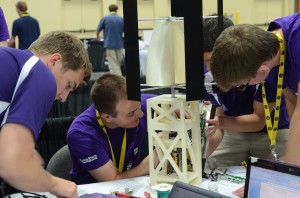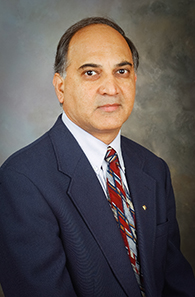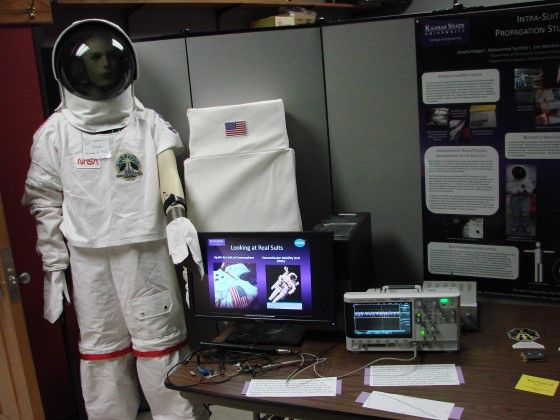
The competition, in Las Vegas in early May, challenged 10 universities across the country to design and construct a lightweight, transportable wind turbine that can power small electronic devices such as a cellphone, tablet or laptop computer. The university teams were made up of engineering students — mechanical, biological systems and electrical on the Wildcat team — as well as business students to help with the competition’s required marketing plan.
“This exciting, educational and challenging experience provided a new interactive way for college students to develop fresh ideas,” said Miller, associate professor of electrical engineering and the adviser to the Kansas State University team.
While the university’s team didn’t win the competition, Miller said the team did stand out with its marketing plan. Each team had to develop an efficient marketing plan to sell to different companies. Kansas State’s team decided to focus on power generation during coastal disasters and emergencies, as well as providing lighting on boardwalks and piers without using grid power.
Along with Miller, faculty involved with the team include Greg Spaulding, instructor of mechanical engineering; Youqi Wang, professor of mechanical engineering; and Kim Fowler, doctoral student in electrical engineering who has assisted with the business team. The team also has received some business advice from Jason Schmitt, a Kansas State University alumnus who owns a semiconductor business.
Students on the Kansas State University team include:
Shae Pelkowski, senior in electrical engineering, Derby; Armando Marquez, junior in electrical engineering, Dodge City; Tanzila Ahmed, senior in electrical engineering, Garden City.
From Manhattan: Matthew Clark, senior in electrical engineering; Bret Gross, senior in mechanical engineering; Martin Mixon, senior in electrical engineering; Aaron Thomsen, senior in mechanical engineering; and Cody Yost, senior in mechanical engineering.
Lane Yoder, senior in mechanical engineering, McPherson; James Remley, senior in electrical engineering, Miltonvale; Joseph Kuhn, senior in mechanical engineering, Olathe; William Duren, senior in electrical engineering, Rose Hill; Jordan Robl, senior in mechanical engineering, Salina; Zachary Wassenberg, senior in electrical engineering, Seneca; Aaron Akin, sophomore in biological systems engineering, Shawnee; and Lawryn Edmonds, freshman in mechanical engineering, Valley Falls.
From out of state: Stuart Disberger, senior in mechanical engineering, Arvada, Colo.







